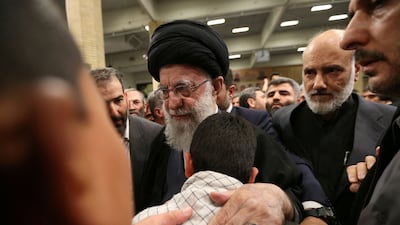Live updates: Follow the latest on Israel-Gaza
Israel will retaliate against Iranian territory if it is attacked by Iran, Israel's foreign minister said on Wednesday, as both countries trade threats against the backdrop of heightened regional tensions.
Foreign Minister Israel Katz made the public warning in posts in Hebrew and Farsi on X directed at Iran's Supreme Leader Ayatollah Ali Khamenei's account, shortly after the Iranian leader said Israel was an “evil regime” that “must be punished” for a deadly attack on the Iranian embassy compound in Damascus on April 1.
Mr Katz's words were followed with a post on X by Defence Minister Yoav Gallant, who told soldiers in northern Israel that the military would "respond strongly" against "any enemy".
"We maintain high alertness in all defence formations - we will know how to defend against the threats of our enemy in our territory, and react strongly against any enemy in his territory," Mr Gallant said.
Israel has been fighting Iran-backed Hezbollah in Lebanon and attacked Iranian targets in Syria alongside its war in Gaza against Hamas, which is supported by Iran.
The stakes of the conflict were raised earlier this month when several senior Iranian generals were killed in an attack on the country's embassy compound that was widely blamed on Israel.
Iran's supreme leader Ayatollah Ali Khamenei had used his Eid Al Fitr sermon to renew threats of retaliation over the attack on the embassy compound.
He also said Israel's intensified bombing of Gaza during Ramadan left a "bitter taste" for Muslims and criticised western governments for their support of Israel.
The Israeli strike on Iran's embassy compound in Damascus killed senior members of the Islamic Revolutionary Guard Corps, including Mohammad Reza Zahedi, who led the Quds Force in Syria and Lebanon, and sent tensions soaring between the countries.
“When they attack our consulate, it means our territory has been attacked,” state outlet Irna quoted Mr Khamenei as saying during Eid Al Fitr prayers at the Grand Mosque in Tehran.
“The evil regime made a mistake and must be punished and will be punished.”
Mr Khamenei has vowed revenge, warning last week that Israel would be "slapped". President Ebrahim Raisi also said Israel would be punished for the attack, which Iran-backed groups have compared to the US assassination of IRGC Quds Force chief Qassim Suleimani in January 2020.
Other Iranian officials have threatened attacks against Israeli embassies.
A number of Israeli embassies have been emptied of staff for fear Iran might attack a mission, and the Israeli military spokesman last week was forced to publicly reassure citizens to end a spate of panic buying.
Israeli authorities have since been preparing for potential Iranian retaliation. Last week, Israel cancelled leave for combat soldiers and has increased GPS jamming in response to threats from Iran.
Iran's retaliation could be a direct attack, which would constitute an escalation, or carried out via Iranian allies such as Hezbollah, a range of militias in Syria and Iraq, or the Houthis in Yemen.
In comments quoted by Israel's public broadcaster Kan, Mr Katz described Iran as the "head of the snake" in relation to its militia allies.
"Iran is the head of the snake – there is no Hamas without Iran, no Houthis, no Shiite-Syrian militias and no Hezbollah," he said.

Hezbollah opened a second front against Israel in support of Hamas following the Palestinian group's attacks on southern Israel on October 7 that killed about 1,200 people.
The Houthis began launching attacks from Yemen on international shipping in the Red Sea in November, in a campaign the rebel group says is in support of Palestinians. The group has continued to fire missiles at ships, also targeting the Israeli port of Eilat, despite the US and UK carrying out air strikes at Houthi targets in Yemen.
Militias in Syria and Iraq have also intensified their attacks against US forces in both countries since October 7, but halted attacks in an apparent unannounced truce between the US and Iran after three American soldiers were killed on the Syrian-Jordanian border in early February.
The US has repeatedly sought to calm regional tensions and prevent a wider war. Washington has sent several high-profile personnel to the region as US President Joe Biden grows increasingly frustrated with Israeli Prime Minister Benjamin Netanyahu.
Washington has urged Mr Netanyahu's government to limit civilian casualties in its operations in Gaza, during which more than 33,000 people have been killed in six months of war.












